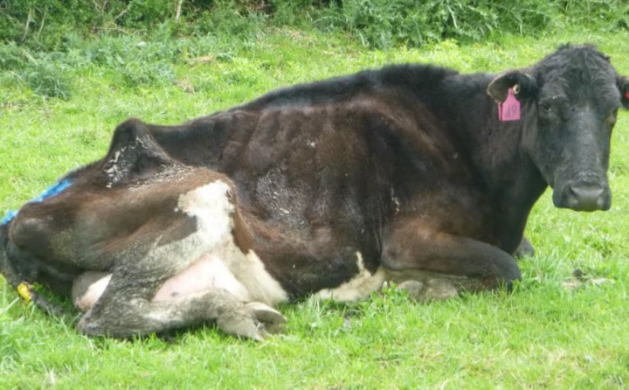
One of the several ill-treated cows owned by farmer Ray Nairn suffered such severe mastitis that "part of her udder dropped off".
But despite the discharging wound, he continued to milk the cow twice a day to supply Fonterra.

Today, the South Taranaki 50/50 sharemilker appeared in New Plymouth District Court facing eight charges brought against him by the Ministry for Primary Industries (MPI) relating to the ill-treatment of animals, one of which was a representative charge.
The court heard Nairn, 54, failed in this obligation to the cattle by not providing sufficient feed or necessary treatment to ensure their welfare.
While Nairn has not previously appeared before the court on animal welfare-related offences, the farm has come to the attention of MPI on other occasions in relation to "low-body condition" dairy cows and underfeeding.
According to the summary of facts, Nairn lived at an Eltham property where he farmed about 63 hectares of land.
He owned the cattle, which included around 230 dairy cattle, 51 calves and nine beef cattle, and was in charge of the day-to-day running of the farm.
On November 3, 2021, an MPI Animal Welfare Inspector and a vet went to the farm following a complaint regarding the poor and deteriorating condition of the cows.
They found an "extremely emaciated" 8-year-old Friesian dairy cow with a uterine infection in a paddock with limited pasture and a small amount of rotten silage. The cow had no energy reserves to draw on to help it maintain its body temperature and was shivering from the wind.
The vet found the extent of the cow’s malnutrition had caused it to experience unnecessary and unreasonable pain and distress, which would only continue. The cow was euthanised on the farm by the inspector.
A heavily pregnant Friesian cow was also found to be emaciated and despite the cow’s critical condition, it was being grazed in a mob with five mature steers and two non-pregnant heifers, which was not advisable.
Nairn acknowledged his grazing of heavily pregnant cows and non-pregnant stock together was not working for the pregnant cows but said he did it because it was "convenient" for him to have one mob rather than two. He stated, "If she would just hurry up and calve she wouldn’t be in here".
The pregnant cow needed to be euthanised, and so too did a cow that was found with a severe infection in the right front quarter of its udder.
"The veterinarian assessed this cow to have suffered from a longstanding mastitis infection, subsequently tissue on her right front quarter had died and sloughed off," the summary stated.
According to the summary, Nairn said to the vet that "part of her udder dropped off on the same day as herd testing".

The cow was suffering significant unnecessary pain and distress, and there was a risk the wound would become fly-blown and maggot-infested.
Another emaciated cow, which also had hip injuries, was found, and a "severally lame" cow had an infected and swollen hoof with ruptured skin.
Nairn also failed to provide sufficient food to seven dairy cows, all of which were in a state of ill health, and did not comply with orders given at the inspection to prevent or mitigate the suffering of two cows.
In court, Crown prosecutor Holly Bullock, who appeared on behalf of MPI, said the offending was serious and Nairn was "highly culpable".
Bullock said the aggravating factors included the pain and distress caused to the cows, that Nairn had the primary responsibility for the animals and he failed to comply with legal directives given by MPI.
She sought a term of home detention for Nairn and a disqualification of him from owning cattle.
Defence lawyer Andrew Laurenson acknowledged the pre-sentence report recommended home detention but argued for community detention.
He said Nairn had health issues and it would be helpful if he could leave his home, he also did not have any previous convictions and had demonstrated remorse, albeit in his "own way".
Nairn was a man of few words, had lived a "hermit-like lifestyle", and had farmed for most of his life.
He has attended counselling since the offending, which Laurenson said would have been an experience "almost from a different planet" for Nairn.
Laurenson asked that if a ban on owning cattle was imposed that Nairn be allowed to own "a couple of stock", as it was all he knew.
The offending was out of character for Nairn, who at the time was stressed, over-stocked, and never intended to cause any cruelty to animals, Laurenson submitted.
Judge Gregory Hikaka acknowledged that since the offending, Nairn had passed all compliance visits and the animals’ health had improved.
"You have come some way to appreciating that there is a better way than that which you described to the report writer as ‘old fashioned, just like your dad farmed’."
However, the judge said the offending involved a high level of neglect and negligence, an abuse of trust and non-compliance.
He also noted New Zealand’s high standing when it came to dairying and said actions such as Narin’s had the potential to undermine the country’s global position.
Judge Hikaka imposed a sentence of four months of home detention and six months of post-detention conditions.
He made a general disqualification of Nairn owning stock for 18 months and ordered him to pay the vet’s costs of $4597.13.
- Tara Shaskey, Open Justice reporter













